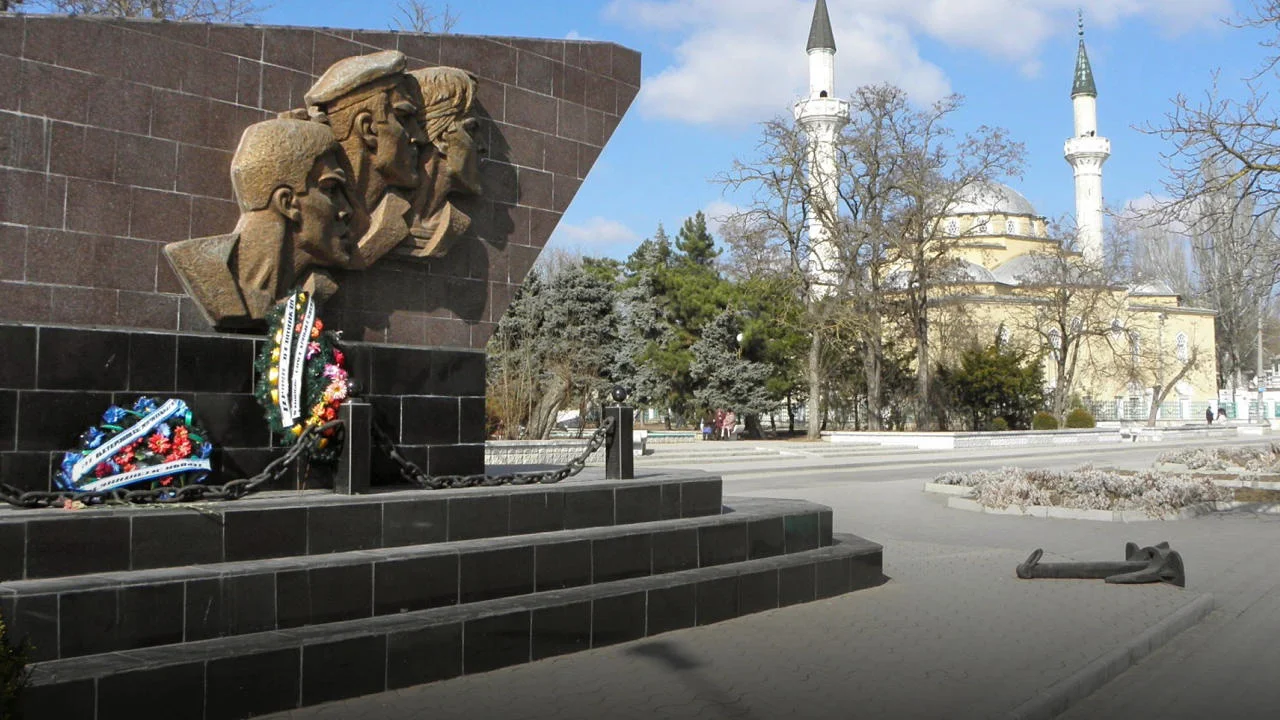Were Crimeans really pro-Russian before annexation?

Contents
- How did Crimea’s residents feel before the war?
- Illegal, pointless and undesirable: a common view of Russian citizenship pre-2014
- Politics of nationalism and identity is not as important as we think
- Why were pro-Russian political parties unsuccessful in Crimea?
- The violence of the past must be remembered
When Russia annexed Crimea in March 2014, many pitched annexation as if it was a desirable outcome for Crimea’s residents. After all, weren’t most of Crimea’s residents not only ethnically Russian but also pro-Russian? Weren’t they already Russian citizens?
Russia held a referendum seemingly to demonstrate support for annexation. But referenda do not tell us about how citizens feel or identify, especially when held during an armed occupation by Russian soldiers. My latest book, Kin Majorities, exposes a more complex reality.
Here, I share insights from Kin Majorities based on qualitative fieldwork that I conducted in Crimea prior to annexation. This data, collected during a time of calm, questions what we actually know about the varying identities and preferences of Crimea’s residents, at a time when annexation was inconceivable.
Examining these questions in the wake of Russia’s war against, and invasion of, Ukraine might seem old news. But remembering the circumstances that led Russia to annex Crimea is as important now as ever.
Crimea’s residents viewed Russian citizenship as inaccessible, undesirable, illegitimate, and illegal.
How did Crimea’s residents feel before the war?
My research shows that identity in Crimea was far more complex than a region with a Russian, or pro-Russian, majority. Few in Crimea identified as pro-Russian nationalists. In fact, only those I interviewed within pro-Russian parties and movements identified as such. Instead, many identified as ethnically Russian, but with few cultural or political ties to Russia. Many others identified as between Ukraine and Russia: as Crimean. Meanwhile, many younger people did not identify, ethnically, even as Russian speakers, rather they identified as Ukrainian citizens.
We know we had underestimated the strength of people’s political identification with Ukraine before Russia’s war against Ukraine. Equally, we underestimated Ukraine’s capacity to mobilise citizens. Crimea was considered particularly unlikely to be a region with a community identifying foremost as Ukrainian citizens. Yet, in Kin Majorities I explore how political identification with Ukraine was important for many in Crimea before annexation, especially younger people.
Illegal, pointless and undesirable: a common view of Russian citizenship pre-2014
My book also highlights the fact that Crimea was passportised by Russia after annexation and not before. We know there were pockets of Russian citizens in Sevastopol before annexation – primarily those connected to the military, or military pensioners. But, outside of these pockets, there is little evidence of en masse acquisition of Russian citizenship before 2014.
My research shows that it is likely that Crimea was not passportised by Russia prior to annexation because Crimea’s residents viewed Russian citizenship as inaccessible, undesirable, illegitimate, and illegal.
Only the minority in pro-Russian parties wanted Russian citizenship. They wanted it to provide leverage against Ukraine. But Russian citizenship was not accessible to them. It was illegal by Ukrainian law. And Russia did not seem to facilitate access to Russian citizenship in Crimea – even for those in pro-Russian parties.
Instead, most people I interviewed in Crimea saw Russian citizenship as illegal and pointless. Even if Russian citizenship had been accessible for them, it would still have been undesirable. Russian citizenship failed to offer much in the way of rights they needed or wanted. Instead, they respected Ukraine’s laws where dual citizenship was illegal.
Was annexation more about pro-Russian nationalism or furthering profit from corruption and organised crime?
Among those I interviewed, there was also little support for annexation or separatism before 2014. Annexation, or separatism, seemed inconceivable and undesirable.
Instead, most of those I interviewed supported the territorial status quo. They viewed Crimea as a legitimate part of Ukraine and themselves as legitimate citizens of Ukraine.
Most of those I interviewed saw no benefits to annexation or separatism. They preferred the territorial status quo, not because of stability. For them, Crimea was a legitimate part of Ukraine. They identified with Ukraine, not against Ukraine.
Politics of nationalism and identity is not as important as we think
My book reveals that far less in post-Soviet politics boils down to politics of nationalism and identity than we think. Instead, political elites often use identity politics as a veil for their own corruption.
Ukraine’s “party of power” – Party of Regions, led by Viktor Yanukovych – was highly corrupt and used control in Crimea for profit. But pro-Russian political parties in Crimea were also highly corrupt.
As backed up by news sources, interviewees described those involved in pro-Russian politics in Crimea as heavily implicated in corruption and organised crime.
Why were pro-Russian political parties unsuccessful in Crimea?
Pro-Russian political parties were unsuccessful in Crimea for two reasons: first, their ideology failed to appeal. Second, their style of politics, via corruption and organised crime, made these parties illegitimate and unpopular to voters.
However, annexation catapulted pro-Russian politicians – namely Sergei Aksenov – into power because of Russia’s support.
These facts should lead us to question: was annexation more about pro-Russian nationalism or furthering profit from corruption and organised crime?
The violence of the past must be remembered
My final insight is that we must remember the violence wrought by Russian and Crimean authorities against Crimean Tatars. In 1944, Soviet authorities deported the Crimean Tatar community from Crimea under fabricated claims Crimean Tatars were “Nazi collaborators”. Many died while being deported.
Crimean Tatars were only able to return to Crimea in the late 1980s. Since annexation, many Crimean Tatars once again live in exile outside Crimea. Within Crimea, many Crimean Tatars, as well as dissidents, have faced tremendous human rights abuses since annexation, including beatings, intimidation, kidnappings, and murder.
Russia’s war against Ukraine since February 2022 is an opportunity to remember the violence that Russia has wrought against Crimea’s residents, as well as residents of Luhansk and Donetsk oblasts since 2014. It is an opportunity to recognise Russia’s continued breaking of international law. It is not a time to forget, but to keep questioning and remembering.
Images: Dr Eleanor Knott
Download a PDF version of this article




